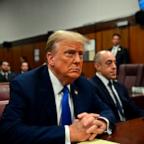Euro is becoming the it currency
PARIS -- Despite squeals of pain from European exporters, the strength of the euro is fast propelling Europe's single currency into a juggernaut.
Currency traders from Egyptian street hawkers to Asian central banks are looking to the euro as a better store of value as the U.S. dollar erodes. The shared 13-nation currency hit $1.4966 on Friday, another record high against the once steadfast dollar.
As well as being the world's currency of choice in central bank reserves, the dollar has long been the de facto second currency in street markets and on tourist menus around the world.
Today, market traders in Luxor — site of the ancient Egyptian city of Thebes — snub dollars in favor of euros or local currency. In Russia, shops, restaurants and hotels that once listed prices in the mighty dollar rather than the unstable ruble have increasingly pegged prices to the euro.
While these trends are unlikely to perturb currency markets, concern is growing that foreign investors may start dumping their dollar-holdings. In particular, traders are watching China's central bank for changes in its portfolio.
Most of China's $1.43 trillion reserves are in dollar-denominated assets such as U.S. Treasuries, and officials aren't happy about the U.S. currency's decline. Zhou Xiaochuan, head of China's central bank, urged U.S. Treasury Secretary Henry Paulson on Thursday to boost the dollar, according to the Xinhua government news agency.
The euro — introduced to financial markets in 1999 and in notes and coins form in 2002 — has risen as a share of global official reserves from 17.9% in 1999 to 25.8% in 2006, according to the International Monetary Fund. In the same period the dollar's share has fallen from 71% to 64.8%.
The dollar's reserve-currency status confers important benefits to the USA — such as being able to borrow in its own currency and making life easier for exporters. Earlier this month Paulson defended the U.S. position.
"The dollar has been the world's reserve currency since World War II and there is a reason," he told Treasury reporters. "We are the biggest economy in the world."




